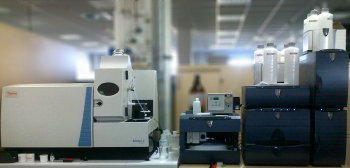Thermo Fisher Scientific Inc., the world leader in serving science, today announced that its Dionex ICS-5000 reagent-free ion chromatography system can be coupled with the Thermo Scientific XSERIES 2 ICP-Q-MS to create a proven IC-ICP-MS method for detecting trace elements, including levels of organic and inorganic arsenic in apple juice.
A Consumer Reports investigation recently revealed elevated levels of arsenic in juice samples.

Thermo Fisher's highly sensitive and selective equipment can distinguish between both inorganic and organic types of arsenic. The distinction is important, as inorganic forms of arsenic are highly toxic whereas organic forms are not. Arsenic is a naturally-occurring element that is sometimes found in drinking water and fruit juices, entering during agricultural and industrial processes. Because typical levels of total arsenic found in apple juice are lower than the U.S. Environmental Protection Agency (EPA) drinking water maximum contaminant level, apple juice is generally considered safe and is currently not regulated.
"Thermo Fisher has developed a highly sensitive and specific method for analyzing arsenic levels in apple juice," said John W. Plohetski, vice president and general manager, ion chromatography/sample preparation business unit at Thermo Fisher. "The ability to distinguish between organic and inorganic forms of arsenic is critical, and our equipment is sensitive enough to capture that data accurately and reliably."
To demonstrate the capabilities of the combined Dionex ICS-5000 and Thermo Scientific XSERIES 2, Thermo Fisher tested four apple juice brands purchased from a local supermarket. Using the Dionex IC system for chromatographic separations and the XSERIES 2 mass spectrometer for identification, researchers developed a highly sensitive, routine IC-ICP-MS method for determining trace metal species, including arsenic. The method can be used in the analysis of different juices after a simple 10-fold dilution.